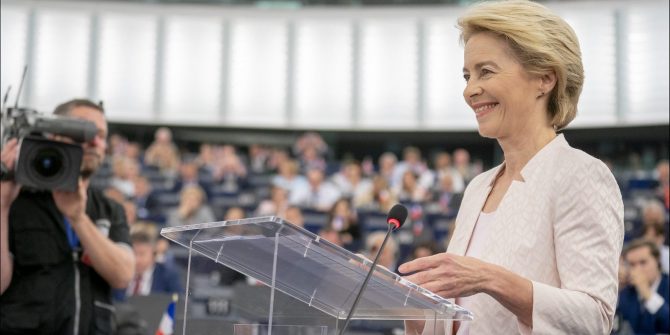 The EU is a major concern for the European far right, which considers it a threat to national sovereignty – a remote bureaucracy in which “nationalist” forces have no voice. However, today, few relevant populist radical right parties still want to leave the EU, writes Cas Mudde (University of Georgia) in his latest book, The Far Right Today. This is partly due to the European backlash to the incompetent handling of Brexit by the UK government, he contends. Most populist radical right parties remain Eurosceptic, however, wanting to “reform” the EU into a looser and more democratic organisation which returns national sovereignty to its member states.
The EU is a major concern for the European far right, which considers it a threat to national sovereignty – a remote bureaucracy in which “nationalist” forces have no voice. However, today, few relevant populist radical right parties still want to leave the EU, writes Cas Mudde (University of Georgia) in his latest book, The Far Right Today. This is partly due to the European backlash to the incompetent handling of Brexit by the UK government, he contends. Most populist radical right parties remain Eurosceptic, however, wanting to “reform” the EU into a looser and more democratic organisation which returns national sovereignty to its member states.
The far-right lives in a dog-eat-dog world in which international relations are a zero-sum game: everyone is out for their own success, and so when one wins, the others lose. This is not to say it opposes any international cooperation, or does not care about other countries (or nations), but rather that this is always at best secondary to national (or racial) concerns – hence, Trump’s “America First” policy has many national variants. Moreover, far-right groups have always been very suspicious of, and mostly outright hostile to, supranational organisations, from the strong EU to the much weaker United Nations (UN). But as much as they criticise the existing world order, they don’t really have clear alternative visions, let alone one unified vision.
 Irredentism, or the claim on some “lost” territory, plays a major role in the political program of many far-right groups, particularly in Central and Eastern Europe, where borders have shifted repeatedly in the past century. For instance, with the 1920 Treaty of Trianon, Hungary lost almost two-thirds of its territory something that all the country’s far-right organisations are obsessed with From Fidesz to the 64 Counties Youth Movement, they claim to represent all “ethnic Hungarians” – including the millions of Hungarian speakers in Romania, Serbia, Slovakia, and Ukraine – and strive to reunite all Hungarian territories. Similarly, the struggle for Greater Israel (Eretz Yisrael) is at the heart of almost all Israeli far-right groups, while far-right organisations in India and Japan are focused on border disputes with Pakistan and China, respectively. The far right in Russia has a particularly dazzling myriad of irredentist fantasies, from a Eurasian Empire to a renewed Soviet Union under (explicit) Russian leadership. The most extreme is that of Vladimir Zhirinovsky, the longest-serving leader of a major far-right party in the world, the terribly misnamed Liberal Democratic Party of Russia. He once stated that he dreams of a time “when Russian soldiers can wash their boots in the warm waters of the Indian Ocean.”
Irredentism, or the claim on some “lost” territory, plays a major role in the political program of many far-right groups, particularly in Central and Eastern Europe, where borders have shifted repeatedly in the past century. For instance, with the 1920 Treaty of Trianon, Hungary lost almost two-thirds of its territory something that all the country’s far-right organisations are obsessed with From Fidesz to the 64 Counties Youth Movement, they claim to represent all “ethnic Hungarians” – including the millions of Hungarian speakers in Romania, Serbia, Slovakia, and Ukraine – and strive to reunite all Hungarian territories. Similarly, the struggle for Greater Israel (Eretz Yisrael) is at the heart of almost all Israeli far-right groups, while far-right organisations in India and Japan are focused on border disputes with Pakistan and China, respectively. The far right in Russia has a particularly dazzling myriad of irredentist fantasies, from a Eurasian Empire to a renewed Soviet Union under (explicit) Russian leadership. The most extreme is that of Vladimir Zhirinovsky, the longest-serving leader of a major far-right party in the world, the terribly misnamed Liberal Democratic Party of Russia. He once stated that he dreams of a time “when Russian soldiers can wash their boots in the warm waters of the Indian Ocean.”
A second obsession of most far-right groups is supranational organisations, which are seen as a first step towards (cosmopolitan) one-world government. While most far-right groups are not fond of the UN, almost only US groups make a big issue out of this largely toothless organisation. Conspiracy theories about secret plans to invade and occupy the US – ranging from Agenda 21 to black helicopters – reach deep inside the conservative movement, while far-right groups see the dawn of a “New World Order,” after former President George H.W. Bush’s famous “slip of the tongue” in a 1992 speech. Israeli far-right groups consider the UN to be an antisemitic organization, dominated by Arab states, and intent on destroying the State of Israel. And in his maiden speech to the Australian parliament in 2016, Australian ONP senator Malcolm Roberts called upon his country to leave the “socialistic, monolithic” UN.
Unsurprisingly, the actually powerful EU is a major concern for the European far-right, which considers it a threat to national sovereignty. As Euroscepticism started to spread among European publics in the wake of the 1992 Maastricht Treaty, most far-right groups and parties became more outspoken and radical in their opposition to the EU. This has only increased after the so-called “refugee crisis” of 2015, as German chancellor Angela Merkel’s pro-refugee policy and the EU’s (ultimately unsuccessful) refugee redistribution plan infuriated the far right. This sentiment is clearly expressed in a 2018 tweet by Santiago Abascal, the leader of the newest stars in the European populist radical right firmament, the Spanish party Vox, who ranted against “the globalist oligarchy, freeloading on [public] budgets, which hopes to impose failed models on the people, [and] now dedicates itself to demonising democracy and the sovereignty of nations.”
During the third wave, most populist radical right parties were on the defensive with respect to European integration. Only a few openly called for their country to exit the EU, but almost all parties believed that the integration process had gone too far, particularly after the signing of the Maastricht Treaty, and wanted to roll back newer initiatives and stop further integration. The EU was seen as a hostile and remote bureaucracy in which “nationalist” forces had no voice. As a consequence of their growing electoral successes and political relevance in the fourth wave, populist radical right parties have become more ambitious and bold with regard to the EU. This is particularly true for populist radical right leaders in Central and Eastern Europe, who see their own countries as the “bulwark of Christianity” (PiS leader Kaczyński in Poland) and “the future of Europe” (Fidesz leader Viktor Orbán in Hungary).

Today, few relevant populist radical right parties still want to leave the EU. Both Marine Le Pen and Geert Wilders had shifted to an exit position in 2013, only to muddle it later on – partly due to the European backlash to the incompetent handling of Brexit by the British government. Most populist radical right parties remain Eurosceptic, however, wanting to “reform” the EU into a looser and more democratic organisation which returns national sovereignty to its member states. Still, they differ on the fundamental nature of the future Europe. Ethnic nationalist parties like the Belgian VB want a “Europe of Nations,” but state nationalist parties like France’s RN and Spain’s Vox prefer a “Europe of Fatherlands” (i.e. current states), fearing separatism at home. And while Fidesz and PiS call for a “Christian Europe,” most West European populist radical right parties are much less comfortable with a continent defined in explicitly religious terms.
Finally, far-right parties are deeply divided on how the world should be ordered. During the Cold War, many radical right parties, somewhat grudgingly, supported the western NATO alliance, while most extreme right groups proposed a post-fascist Third Way. Today, many are worried about a uni-polar world dominated by the US, even under President Trump, and embrace a stronger Russia to counter US hegemony. True to visions of French grandeur, Marine Le Pen has proposed a nationalist Washington–Paris–Moscow axis between her, Trump, and Putin. But many East European far-right groups, like EKRE and PiS, are deeply Russophobic and prefer a US-dominated world. Similarly, in India Modi seems fairly supportive of a dominant US, for now, while in Brazil Bolsonaro has vowed to work with Trump, in particular, to oppose China’s growing power.
This post represents the views of the author and not those of the Brexit blog, nor the LSE. It is an edited extract from The Far Right Today published by Polity (2019). Image by r. nial bradshaw, Some rights reserved.
Cas Mudde is Stanley Wade Shelton UGAF Professor of International Affairs at the University of Georgia.







I suspect most of the far-right parties are waiting to see how Brexit plays out. If in 5 years the UK is banging on the door wanting to be let back into the EU again, then life outside the EU won’t seem so rosy. If the UK manages to keep on going much as now, then the far right will want some of that too.
Of course most countries in the EU would have much bigger problems leaving than the UK. The NI border question may be tricky, but nothing compared to the borders most EU countries have with the other EU + EFTA countries. And getting out of the Euro is hard. But I don’t expect such considerations to weigh much with parties like the AfD, who are not famed for common sense.
It’s weird that the Ultra Hard Right in Poland get called “Liberals” because they let Western Big Business write the tax rules and let the rule of law collapse,* whereas the people who ask Western Big Business to pay tax, set up main pillars (formerly missing) of the Welfare State and enforce the rule of law are called the “Far Right”.
Could we start off every article by saying that Christianity is a rabid religion of hate and that oligarchs are cool? That way we’d at least know that everything is a phoney, not to be taken seriously!
*(i)The President’s plane being blown up in 2010 was hilariously ruled “pilot error”, even though hundreds of pieces of debris tested positive for explosives and passenger door two blew out with explosive force — together with human intestines and hands — 500 metres before the plane hit the ground; (ii) the Russian mafia was allowed by Tusk (who had been directly informed by his ABW security agency) to import fuel into Poland by road tanker at a loss of GBP 15 billion to the economy – this stopped overnight when Tusk’s party was voted out; (iii) Jola Brzeska – brutally slain as part of Europe’s largest property scandal, largely unreported in the West – her murder wasn’t investigated until all the evidence had been destroyed. Her politically-damaging murder wasn’t reported by the BBC correspondent in Poland or by the news agencies.